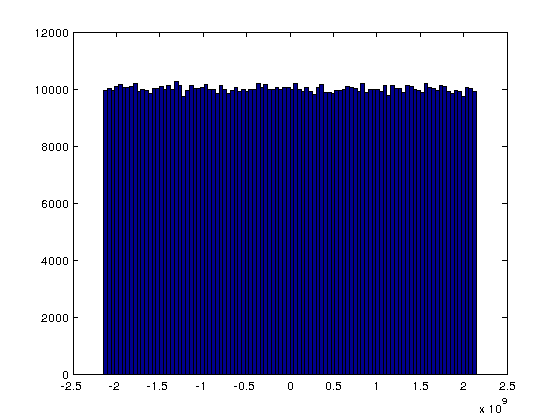

Std::normal_distribution distribution(5.0, 2.0) // distribution parameters, mean (μ=5.0) and stddev (σ=2.0),įor (size_t i = 0 i = 0.0) & (number < intervalCount)) ++draws If you are compiling for non AVR Arduino (ESP32 for example) then you could use std::normal_distribution I'm thinking about a random, going through a Gaussian curve, and then through a 10log curve for the human eye. Click on the blue text for the sketch, use the green button for the simulation in Wokwi. The examples "millis_soft_pulsating_led.ino" and "millis_led_heartbeat.ino" have a curve. Perhaps what you have in mind will be visually not the same.Īt Github I have a Fun with millis page. To generate the pseudo-random numbers in Arduino, we can use the built-in functions random() and randomSeed(), of Arduino. If you want a certain visual effect, then there are easier ways to implement a curve.ĭid you know that the human eye sees brightness with almost a 10log curve ? That is a very steep curve. Why do you need something sophisticated for just a led ? Sure, you can use that Gaussian library and convert the value to a 0.255 integer for the PWM. In the end, the Arduino random() function which uses the GCC compiler random is not so bad, it pretty evenly distributed. The 2nd should be a float (with random decimals) between 0.01 and 4.00 (ex. The 1st should ideally be an int between 1 and 7, inclusive. Currently I need to generate 2 random numbers. This topic might get flooded with everyone talking about random and what they think is best. does random () not generate decimals been trying to get a fairly simple RNG up and running. Uint32_t fullrand = (rand1 << 1) ^ rand2 Īlternatively just working with 31 bits instead of 32 may be enough for your needs and would be faster than generating two numbers and combining them just to fill that one extra bit.Ask 10 programmers about random, and you get 100 opinions Maybe left shifting one value by one bit and the XORing them together would be enough: uint32_t rand1 = random() The best you can do to get 32 bits of random data is to take two random 31 bit values and combine them. However that is only ever going to be 31 bits, so your most significant bit will always be zero. That means that the widest range you can get is from random() directly, whilch is the same as random(0, RANDOM_MAX). The random(min, max) function takes the value from random() and manipulates it to fit into the specified range (calculate the offset difference, modulus the random value by that difference, then add the lower offset). The random() function returns a number between 0 and RANDOM_MAX (0x7FFFFFFF). So I need a better understanding of random()'s behaviour to do it right! With this approach, I can reach the desired speed but I'm concerned about the statistics.

I need the speed to be able to reach high refresh rate (60-100Hz), with normal statistical distribution to avoid bias in neuron response analysis. The microcontroller that the Arduino uses (and for that case, most computers in general). It is for a visual neuroscience experiment where each "pixel" is either ON or OFF. A purely random number in the mathematical sense cant be predicted.
ARDUINO RANDOM NUMBER GENERATOR
A randomSeed (analogRead (0)) in Arduino initializes the pseudo-random number generator that reads the random analog noise from an unconnected analog pin 0 and floats to relatively random values between. I am working on a device made of Neopixel LED strips. Arduino: Random Numbers & Delay RandomSeed. Is there some seed known to be good or bad at this?.random(0, 2^16) for a "better" distribution? Is it a valid approach? Do I expect each bit to be uniformly distributed? Should I use fewer bits, e.g.I tried several MIN and MAX, also simply random() but without success. What are MIN and MAX so that the LONG random uses all bits, with value ranging from -2,147,483,648 to 2,147,483,647 ( arduino long type).Long rdm = random(MIN,MAX) // Generate a number in range MIN,MAX of type long 1024 is a small number and is cannot whistand a brute force attack. The content is modified based on Official Arduino References by: adding more example codes and output, adding more notes and warning.

ARDUINO RANDOM NUMBER MANUAL
So I thought about using all bits of a random number on the whole range as such: randomSeed(100) // A seed to always keep the same sequence The Arduino Reference Manual suggests using an 'random' value from the analog pin when initialising the seed for its PRNG, but since the resolution of the chip's ADC is only 10-bit, there are only 2 10 different seeds. A random number from 0 to 299: 52 A random number from 10 to 19: 15 A random number from 0 to 299: 165 A random number from 10 to 19. For booleans, one usually uses random(0,2) but in my case I need about 250 booleans and calling random every time is slow. I am looking for a way of generating booleans rapidly.


 0 kommentar(er)
0 kommentar(er)
